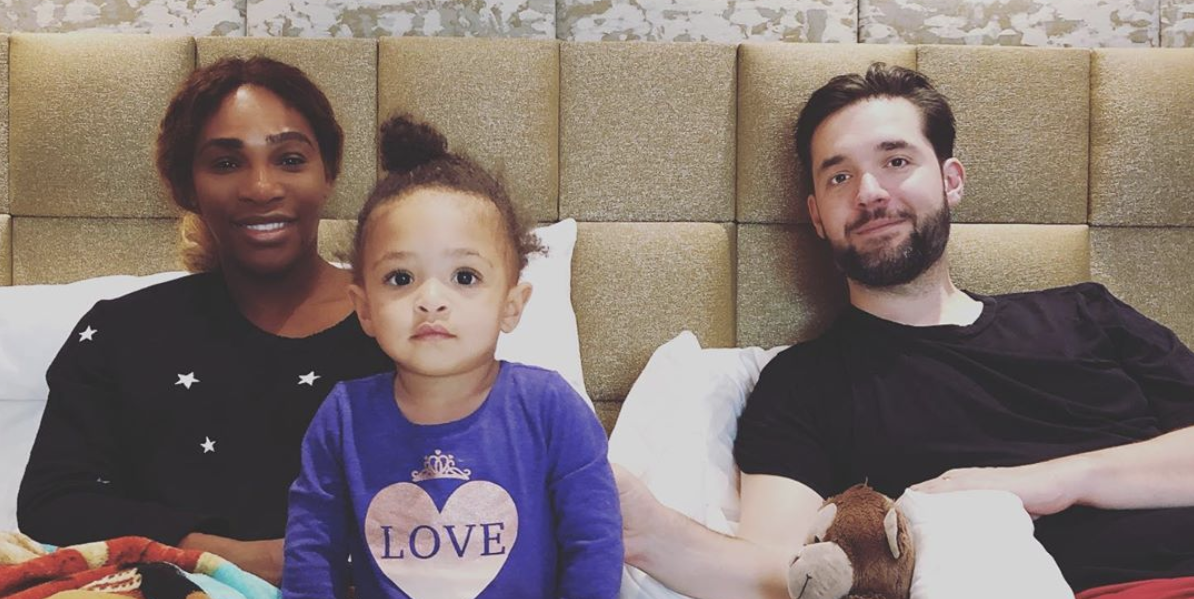Alexis Ohanian Reflects on Watching Serena Williams Almost Die After Giving Birth

Alexis Ohanian describes Serena Williams' "near-fatal complications" during their daughter Olympia's birth in 2017.
The reddit co-founderOhania says that "paternity leave was crucial" for their family, and urges new dads to take the time if they're able to.
"Taking leave also set me off on the right foot for sharing parental responsibilities," Ohanian writes in a New York Times op-ed.
Becoming a new parent is an intense experience in the best of conditions—you've got a tiny, screaming newborn to keep alive, to say nothing of the sleep deprivation. But for Serena Williams, the arrival of baby Alexis Olympia Ohanian Jr. also came with serious danger to her health and a particularly difficult recovery. Williams' husband, Reddit co-founder Alexis Ohanian, opens up about those joyful-yet-harrowing first few months in a new New York Times editorial and explains why his paid paternity leave was so essential. Ohanian also says it helped him start off "on the right foot" as a dad.
"Before Olympia was born, I had never thought much about paternity leave and, to be honest, Reddit’s company policy was not my idea," Ohanian, who was able to take 16 full weeks off, admits.
"Then came Olympia, after near-fatal complications forced my wife, Serena, to undergo an emergency C-section," he continues. "Serena spent days in recovery fighting for her life against pulmonary embolisms. When we came home with our baby girl, Serena had a hole in her abdomen that needed bandage changes daily. She was on medication. She couldn’t walk." (Williams detailed her rocky postpartum experience in a January 2018 Vogue profile.)
While Ohanian acknowledges his new family was lucky enough to have help, those first few weeks were still "incredibly difficult."
He also drops some staggering statistics that highlight just how systematically unsupported new mothers and fathers are the United States: "Nearly one in four employed women giving birth in the United States is back at work within two weeks," Ohanian says. "Only 9 percent of work sites in the United States offer paid paternity leave to all male employees, and 76 percent of fathers are back to work within a week after the birth or adoption of a child."
A post shared by Alexis Ohanian Sr. (@alexisohanian) on Aug 12, 2019 at 9:22am PDT
Furthermore, even dads who do get paid paternity leave don't always take it. According to Ohanian—and a recent poll he cites—that's partly due to a fear that employers would ding them for the time off.
"Nearly a third of dads think that taking leave could negatively impact their career," Ohanian writes; that fear can dredge up other worries that they'll lose their job and won't be able to financially support their families.
A post shared by Serena Williams (@serenawilliams) on May 12, 2019 at 6:05am PDT
Ohanian urges those dads who are able to take paid leave to jump at the chance—and says it also helped him learn how to be an actively-involved parent from day one.
"Taking leave also set me off on the right foot for sharing parental responsibilities," he says. "Two years later, there is no stigma in our house about me changing diapers, feeding Olympia, doing her hair or anything else I might need to do in a pinch. They’re all just dad things (not 'babysitter' things — I hate it when people refer to dads spending time with their kids as babysitting)."
Ohanian's op-ed made me want to jump to my feet with applause—not because a hands-on dad deserves extra praise (as he'd clearly agree), but because paid paternal leave essentially saved me after the birth of my own son last January.
Like Serena I, too, had a "hole in my abdomen" that required daily care after a C-section infection, with other complications to boot. I couldn't lift anything heavier than my baby, nor could I walk unassisted farther than a few steps to the taxis that shuttled me to endless doctor appointments while my partner stayed home to feed and change our newborn. On the days a nurse couldn't come to change my bandages, my partner would perform the mini-surgery on our bed as our son howled in a bassinet two feet away. The fact that he could be there for me—for us—meant everything.
Because neither my son's father nor I have living parents able to help out, I shudder to think of how much darker those first few months would have been had my partner's employer not granted him eight weeks of paid postpartum leave. Every day I thought about parents—mothers and fathers—who are forced to return to their jobs earlier than they'd like, and how fortunate we were.
And Ohanian is right: Paternal leave really did establish an equal partnership when it came to the work of baby care. Once I'd finally healed enough to push a stroller, it was my partner who taught me how to set it up, among so many other baby care lessons he'd had to learn on his own.
"We need a federal bill that mandates quality paid family leave for everyone — birth parents, adoptive parents and caregivers alike," Ohanian writes. Amen to that.
For more ways to live your best life plus all things Oprah, sign up for our newsletter!

